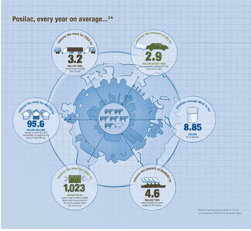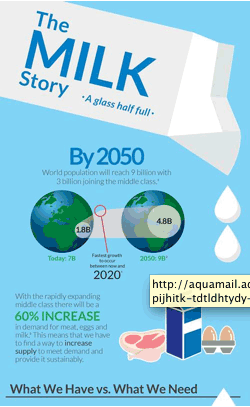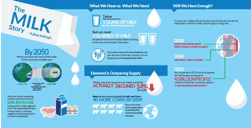
New report details economic and environmental value delivered to dairy industry and society
Since the first commercial sale of Posilac on Feb. 4, 1994, it has helped deliver substantial economic and environmental benefits, in addition to helping today's dairy producers meet a growing demand for milk.
 To date, more than 37 million U.S. dairy cows have been supplemented with Posilac over its 20 years in the marketplace, reducing producers' costs by about $6.3 billion over the two decades or $.50 to $1.50 on every hundredweight.1 Further, Posilac enables cows to produce about 10 lbs. more milk per day.2
To date, more than 37 million U.S. dairy cows have been supplemented with Posilac over its 20 years in the marketplace, reducing producers' costs by about $6.3 billion over the two decades or $.50 to $1.50 on every hundredweight.1 Further, Posilac enables cows to produce about 10 lbs. more milk per day.2Jeff Wilbur, owner of Rio Blanco Dairy in Tulare, Calif., was an early adopter of Posilac and has used the product in his herd nearly continually since. "It offers more milk. The math speaks for itself," Wilbur said. Rio Blanco had a short lapse in use from July 2009 to July 2010 due to market conditions and premiums, but Wilbur reported a significant drop in milk production during that period. "We just didn't have the milk we were accustomed to, so we went back to the product. As the dairy market improved through 2010 and 2011, the added milk was a real thrust to increase gross revenue adding to the financial healing."
 In fact, six U.S. dairy cows supplemented with Posilac produce the same amount of milk as seven cows without it.3 Beyond the economic benefits, it also offers significant environmental resource savings. On average annually over the past 20 years Posilac use has resulted in4:
In fact, six U.S. dairy cows supplemented with Posilac produce the same amount of milk as seven cows without it.3 Beyond the economic benefits, it also offers significant environmental resource savings. On average annually over the past 20 years Posilac use has resulted in4:- 3.2 million tons less feed required annually, enough to fill about 133,300 semi-trucks. (63.4 million tons cumulatively)
- 1,023 square miles less land use required each year, equal to half a million football fields which would be enough to circle the Earth's equator when laid end to end. (20,464 square miles total)
- An average of 95.6 billion gallons less water used annually, or the annual household consumption of the entire state of New Mexico. (1.9 trillion gallons total)
- 4.6 million tons less manure produced, equivalent to the weight of 99 Titanics. (92 billion tons total)
- 2.9 million metric tonnes less CO2 equivalent produced, equal to removing 617,126 cars from the road. (58.5 million tonnes total)
"Posilac plays an important role in reducing the environmental footprint of dairy production," says Dennis Schaffler, senior director of Elanco's dairy business unit. "This is critically important given the World Wildlife Fund reports the world is already overusing its resources, requiring 1.5 years to regenerate annual resource consumption."
 Products like Posilac will be even more important in the future. While global dairy productivity has doubled in the past 50 years, there's 14 percent less milk available per person today than in 1961.5 U.S. dairy producers reduced the deficit by adding an average of 8.85 billion 8-oz glasses of milk4 to our global supply annually due to Posilac use.
Products like Posilac will be even more important in the future. While global dairy productivity has doubled in the past 50 years, there's 14 percent less milk available per person today than in 1961.5 U.S. dairy producers reduced the deficit by adding an average of 8.85 billion 8-oz glasses of milk4 to our global supply annually due to Posilac use.But the gap will likely grow. The United Nations Food and Agriculture Organization (FAO) projects demand for meat, eggs and dairy products to increase by 60 percent6 in the coming decades as 3 billion people enter the middle class7 and demand a higher quality diet. The effects are already being seen. The FAO recently reported global dairy prices have jumped by almost a third in the past year due to growing demand from China, north Africa and Russia amid limited supplies.
On average around the world today, we have access to about one 8-oz. glass of milk (or equivalent serving of yogurt or cheese) a day.5 The global recommended intake is two glasses a day.8 Current per capita milk production around the world already isn't meeting basic nutritional needs.
Elanco assembled a team of researchers to study this issue, led by Dr. Roger Cady, senior technical consultant and global sustainability lead at Elanco. Based on FAO demand estimates and current productivity trends, by 2020 we won't even have access to a glass of milk a day on average globally.
If we look at securing everyone with the two glasses a day our bodies really need for growth and cognitive development, more than 4.5 billion people will not be able to meet their daily nutritional requirement for milk.9
"I'm confident our U.S. dairy producers will play a critical role in meeting the dairy nutrition needs of our growing population," Schaffler said. "But continued innovations will be a key part of the solution. Elanco is pleased to support a breakthrough innovation like Posilac that's delivered so many benefits to dairy producers and society. We are poised to build on that foundation with a robust innovation pipeline that will help producers meet the growing global demand for nutrient-rich dairy products."
To learn more about how you can join the fight for a food secure tomorrow, visit www.sensibletable.com, follow @JeffSimmons2050 and @elanco and use #Feedthe9 to join the discussion on Twitter.
About Elanco
Elanco is a global innovation-driven company that develops and markets products to improve animal health and food animal production in more than 75 countries. Elanco employs more than 3,500 people worldwide, with offices in more than 40 countries, and is a division of Eli Lilly and Company, a leading global pharmaceutical corporation. Additional information about Elanco is available at www.elanco.com.
The label contains complete use information, including cautions and warnings. Always read, understand, and follow the label and use directions. Supplement lactating dairy cows every 14 days beginning at 57-70 days in milk until the end of lactation.
Elanco, Posilac, and the diagonal bar are trademarks owned or licensed by Eli Lilly and Company, its subsidiaries, or affiliates. Posilac® is a registered trademark for Elanco's brand of recombinant bovine somatotropin.
2.14.2014